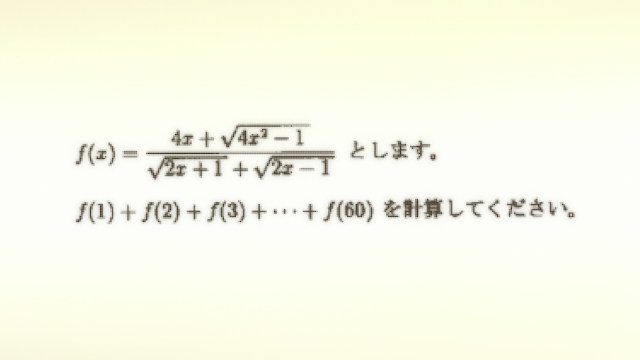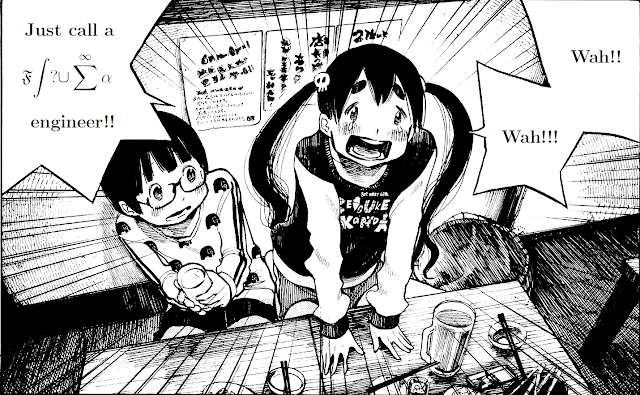The Parlour Game (2.1)
Here we are! The first problem! Without further ado, I give you Exercise 2.1 of Terry Tao's "Solving Mathematical Problems". Needless to say there are spoilers ahead, so if you feel like trying it yourself just look at the pic and then close the window!
Our goal is to find $abc_{10}$ from the sum of the $5$ other numbers given by permutations of $a,b,c$ as digits. Following the hint, using the fact that we can write $acb_{10}$ as $100a +10 c +b$, and by collecting terms, I wrote the sum as follows:
\[\begin{equation} \label{(1)} 100(a+2b+2c) + 10(2a+b+2c) +(2a+2b+c) = 3194 \end{equation}\]
I thought it would be a good idea to factorize the RHS: $3194 = 2 \cdot 1597$ (thanks Wolfram!). The $1597$ is a rather big prime, so I decide not to try anything with that.
The $2$ isn't much more useful since we already knew it was even, but because of how $(1)$ is written, this means that: $2a+2b+c \equiv 0 [2] \iff c \equiv 0 [2]$.
A (very) small victory! Now we know that $c$ is even. In addition to that, we can tell that:
\[\begin{equation*} 2a+2b+c = 4, \ 14, \ 24, \ 34, \ \text{or} \ 44 \end{equation*} \]
since $a,b,c$ are all at most equal to $9$.
Looking at these numbers, it doesn't take much to eliminate at least a couple right away: $4$ is way to small to make the sum reach anywhere near $3000$, and $44$ is way too big. $14$ may have been eliminated this way too, but the other two seemed more difficult so I decided to leave them be for the moment:
\[ \begin{equation} \label{(2)} 2a+2b+c = 14, \ 24, \ \text{or} \ 44 \end{equation} \]
This is already a good constraint, although those $2$'s in front of $a$ and $b$ do get in the way. I tried to find some more constraints based on the $10$'s and the $100$'s parts, but other than bounding the sums a bit more it didn't seem to give me much, so I decided to switch to a shape better suited for modular arithmetic (the second hint) by expanding $\eqref{(1)}$:
\[\begin{equation} \label{(3)} 122a +212b +221c = 3194 \end{equation}\]
With this, I tried mods that seemed "promising". The problem deals with swapping digits, but I realized that something that never changes when swapping is the addition of those digits. The only divisibility rules I know regarding addition of digits are for $3$ and $9$, so I figured they could give me some constraints on $a$, $b$, or $c$ without pesky coefficient on the front:
$$122a+212b+221c \equiv 3194 [3]$$
Cancelling multiples of $3$ we get:
This is very nice already, since we got a condition on $a+b+c$ (i.e. the sum of the digits of $abc{10}$) and we already know that $a+b+c \leq 27$, so we could try case by case. The issue is that it's not strong enough; there's quite a bit of numbers to cross verify with the info we have. This seemed a bit time consuming, so instead I tried mod $9$:
$$122a+212b+221c \equiv 3194[9] $$
Cancelling $9$'s this time:
The last part coming from the fact that $\dfrac{1}{5} \equiv 2[9]$.
This is much better! We have a rather strong condition this time, with the few candidates equal to $7$ mod $9$ being:
\[ \begin{equation} \label{(4)} a+b+c = 7, \ 16, \ \text{or} \ 25 \end{equation} \]
Whenever we discover something new, it's a good idea to see how interacts with previous deductions. In this case, the expression is very similar to $\eqref{(2)}$, and so playing with it a bit:
Now's a good time for cases; we can compare this with the $14, \ 24, \ 34$ we got from $\eqref{(2)}$.
Since $c \leq 8$, we can only have: $14-c = 14$ or $32-c = 24$.
The first case implies that $c=0$, but it's easy to show that even for $a=b=9$ (which would violate other constraints), the sum is much smaller than $3194$.
This leaves $\color{blue}{c=8}$. Once we find one, we enter the endgame!
Replacing in $\eqref{(4)}$, we get $a+b = 8$, so I decided to rewrite $\eqref{(3)}$ to use this two facts:
\[\begin{equation*} 2a+2b+c = 4, \ 14, \ 24, \ 34, \ \text{or} \ 44 \end{equation*} \]
since $a,b,c$ are all at most equal to $9$.
Looking at these numbers, it doesn't take much to eliminate at least a couple right away: $4$ is way to small to make the sum reach anywhere near $3000$, and $44$ is way too big. $14$ may have been eliminated this way too, but the other two seemed more difficult so I decided to leave them be for the moment:
\[ \begin{equation} \label{(2)} 2a+2b+c = 14, \ 24, \ \text{or} \ 44 \end{equation} \]
This is already a good constraint, although those $2$'s in front of $a$ and $b$ do get in the way. I tried to find some more constraints based on the $10$'s and the $100$'s parts, but other than bounding the sums a bit more it didn't seem to give me much, so I decided to switch to a shape better suited for modular arithmetic (the second hint) by expanding $\eqref{(1)}$:
\[\begin{equation} \label{(3)} 122a +212b +221c = 3194 \end{equation}\]
With this, I tried mods that seemed "promising". The problem deals with swapping digits, but I realized that something that never changes when swapping is the addition of those digits. The only divisibility rules I know regarding addition of digits are for $3$ and $9$, so I figured they could give me some constraints on $a$, $b$, or $c$ without pesky coefficient on the front:
$$122a+212b+221c \equiv 3194 [3]$$
Cancelling multiples of $3$ we get:
$2a+2b+2c \equiv 2 [3]$
$a+b+c \equiv 1[3]$
This is very nice already, since we got a condition on $a+b+c$ (i.e. the sum of the digits of $abc{10}$) and we already know that $a+b+c \leq 27$, so we could try case by case. The issue is that it's not strong enough; there's quite a bit of numbers to cross verify with the info we have. This seemed a bit time consuming, so instead I tried mod $9$:
$$122a+212b+221c \equiv 3194[9] $$
Cancelling $9$'s this time:
$ 5a+5b+5c \equiv 8[9]$
$a+b+c \equiv \dfrac{8}{5}[9]$
$a+b+c \equiv 7[9] $
The last part coming from the fact that $\dfrac{1}{5} \equiv 2[9]$.
This is much better! We have a rather strong condition this time, with the few candidates equal to $7$ mod $9$ being:
\[ \begin{equation} \label{(4)} a+b+c = 7, \ 16, \ \text{or} \ 25 \end{equation} \]
Whenever we discover something new, it's a good idea to see how interacts with previous deductions. In this case, the expression is very similar to $\eqref{(2)}$, and so playing with it a bit:
$2a+2b+2c = 14 , \ 32, \ \text{or} \ 50$
$$2a+2b+c = 14-c, \ 32-c, \text{or} \ 50-c$$
Since $c \leq 8$, we can only have: $14-c = 14$ or $32-c = 24$.
The first case implies that $c=0$, but it's easy to show that even for $a=b=9$ (which would violate other constraints), the sum is much smaller than $3194$.
This leaves $\color{blue}{c=8}$. Once we find one, we enter the endgame!
Replacing in $\eqref{(4)}$, we get $a+b = 8$, so I decided to rewrite $\eqref{(3)}$ to use this two facts:
$122a+212b+221c = 3194$
$122a+212b+221 \cdot 8 = 3914$
$122a+212b = 1426$
Breaking the $b$'s into a $122$-sized chunk, this becomes:
$122a+122b+90b=1426$
$122(a+b)+90b=1426$
Replacing $a+b=8$:
$122 \cdot 8 +90b = 1426$
$90b = 450$
$\color{blue}{b=5}$
This in turn means $\color{blue}{a=3}$. So, $abc_{10} = 358$.
A quick look at the calculator shows that this is indeed the number we were looking for!
Well then, that ended up being a bit longer than I expected, but I do hope it's on the same vein as Terry's examples. Some issues that I could see arising with this problem may be:
Nothing terrible, and following false leads is part of solving math problems. I say "false leads", but they may very well end up working if you persevere. It's more about getting the sense of how much to push into some path vs looking for others according to the circumstances. I for one expected to use the fact that $c$ is even and kept it in mind at all times til the very end.
For all I know there's probably a more clever and therefore much shorter way to solve this problem. I leave that to you, dear reader.
As for me, explaining my thinking process was more difficult than I imagined before writing this post, and certainly more difficult than just writing a finished proof. It really is time-consuming and tiring, but fun in some sense.
It's the first one and I think it turned out well, so I'm pretty happy. However, as I foretold in my previous post, I feel like I'm going to leave this project unfinished at some point... we'll see, in any case, time to sleep!
- Paying too much attention to the $1597$ factor.
- Looking at cases a bit too early and so having too many to keep track of.
- Or perhaps spending too much time with $\eqref{(1)}$ since it looks similar ot the expansion of $abc_{10}$.
Nothing terrible, and following false leads is part of solving math problems. I say "false leads", but they may very well end up working if you persevere. It's more about getting the sense of how much to push into some path vs looking for others according to the circumstances. I for one expected to use the fact that $c$ is even and kept it in mind at all times til the very end.
For all I know there's probably a more clever and therefore much shorter way to solve this problem. I leave that to you, dear reader.
As for me, explaining my thinking process was more difficult than I imagined before writing this post, and certainly more difficult than just writing a finished proof. It really is time-consuming and tiring, but fun in some sense.
It's the first one and I think it turned out well, so I'm pretty happy. However, as I foretold in my previous post, I feel like I'm going to leave this project unfinished at some point... we'll see, in any case, time to sleep!





Comments
Post a Comment